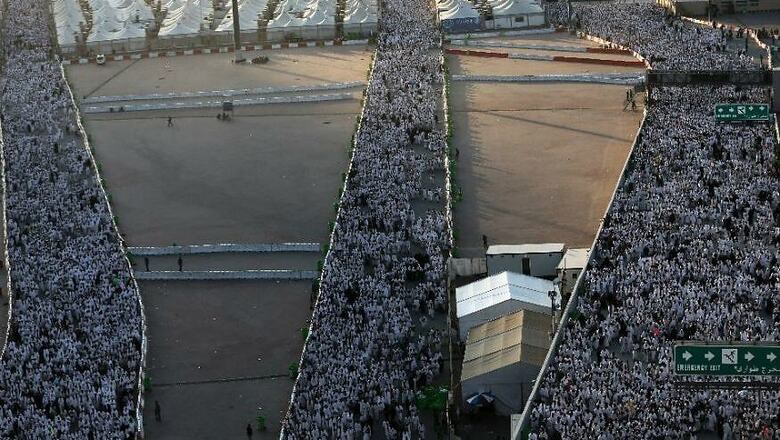
views
Mina (Saudi Arabia): Muslims from around the world on Monday returned to the scene of last year's deadly stampede to perform a stoning ritual near Mecca that is the final major rite of the hajj.
Rivers of pilgrims flowed on multiple ramps toward the Jamarat Bridge where the "stoning of the devil" is taking place under high security.
Authorities in Saudi Arabia do not talk about last year's stampede, which was the worst disaster in hajj history.
Riyadh issued a death toll of 769, although figures compiled from foreign officials in more than 30 countries gave a stampede tally of roughly 2,300.
But a number of safety measures have been taken and pilgrims on Monday expressed no concern.
"There has been a clear improvement," said Saudi pilgrim Ibrahim Ayed, 40, returning for hajj and the stoning for the first time in a decade.
The stoning ritual coincides with Eid al-Adha, Islam's feast of sacrifice, which is celebrated by more than 1.5 billion Muslims worldwide.
Sheep are slaughtered and the meat distributed to needy Muslims, symbolising the prophet Abraham's willingness to sacrifice Ishmael on the orders of God, who provided a lamb in the boy's place at the last moment.
Pilgrims have no need to get blood on their hands, though. They can simply purchase computerised coupons to order a sacrifice -- without even seeing the beast.
The Jamarat ritual, which occurs in Mina at the eastern edge of Mecca, emulates Abraham's stoning of the devil in resisting the temptation to disobey God's order.
Elevated cameras stationed several metres (yards) apart filmed the pilgrims, most clad in white moving behind coloured banners identifying their groups.
The stoning bridge, which resembles a large multi-storey car park, was erected in the past decade at a cost of more than $1 billion (900 million euros).
It was designed to prevent overcrowding.
Hundreds of police were stationed on each of the Jamarat's five floors, linked by escalators, from where pilgrims toss gravel-sized stones against rough stone walls.
- Safety first -
More than 1.8 million faithful, most of them from abroad, are performing the six-day hajj, which ends Thursday.
The hajj is one of the five pillars of Islam and capable Muslims must perform it at least once.
Many pilgrims this year expressed faith that new security measures would prevent a repeat of last year's crush.
Faruk Hamloui, an Algerian who for years has guided his compatriots at the hajj, said "people learned and understood that only organisation and respect for the routes imposed to control the crowds helps to avoid dramas."
It is a message emphasised by officials.
They "stressed the need to adhere to directives and not take lightly the movement of pilgrims towards the Jamarat Bridge," Mahmoud Damanhoori, board member of a local foundation which assists Southeast Asian pilgrims, told AFP.
At the edge of the stoning walls, dozens of officers regulated the flow of pilgrims who sent stones raining down.
Three policemen stationed overhead on a metal promontory sent instructions by walkie-talkie to officers on the ground who intervened when pilgrims lingered too long or blocked the way.
The base of the three walls was covered by a thick layer of foam to soften impact in case of a crush.
"I feel safe. The rest depends on God. I only rejoice at having fulfilled my dream," said Mohammed Rahman, 65, from Bangladesh.
- Stampede memories linger -
Saudi Arabia announced an investigation into the stampede but no results have ever been released.
"There were bodies everywhere. All the streets were littered with bodies," said Kassoum Kouanda, 50, a businessman from Burkina Faso who was injured in the 2015 crush.
He has not returned to Mina but says he is not afraid and sent his young wife to this year's pilgrimage.
"But I gave her clear orders. I told her to follow the official guides," he told AFP by telephone.
Despite safety and security measures which Sunni-dominated Saudi Arabia says it has taken, Shiite Iran has angrily questioned the kingdom's custodianship of Islam's holiest places.
Iran last year reported the largest number of stampede victims, at 464, and its pilgrims are excluded for the first time in decades after the regional rivals failed to agree on security and logistics.













Comments
0 comment